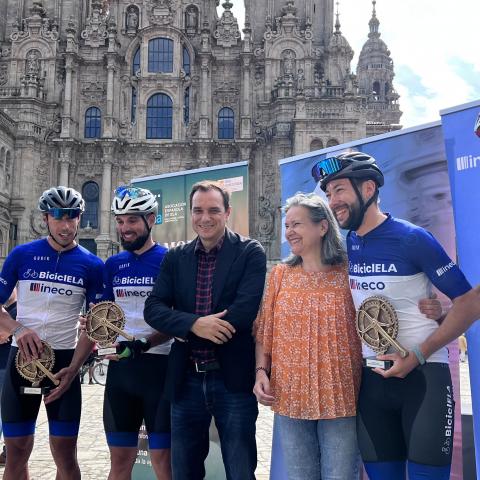The fundraising campaign launched by Ineco professionals will finance 500 hours of home care for people with ALS.
The Plaza del Obradoiro in Santiago de Compostela witnessed the arrival, coinciding with World ALS Day, of the four cyclists taking part in the third edition of the 'BiciclELA' solidarity challenge.
Alejandro Martínez, Roberto Gómez, Borja Jiménez and Iván Hernández completed the more than 640 kilometres between Madrid and the Galician capital in a challenge organised by the Spanish Amyotrophic Lateral Sclerosis Association (adELA), with the collaboration of Ineco and the Foundation for Development and Integration, which has managed to raise the equivalent of 500 hours of home care for patients.
Adriana Guevara, president of adELA, thanked "the commitment of all the people who wanted to join the challenge with their donations so that the Association can continue to offer support to ALS sufferers at home with physiotherapy, speech therapy, psychology or carers".
For Sergio Vázquez Torrón, president of Ineco, "this arrival by bicycle in Santiago de Compostela, the end of all roads, highlights not only the solidarity once again demonstrated by the Ineco team, but also the company's commitment to raising awareness of such a terrible disease as ALS, which affects so many families".
José Criado, general manager of the Foundation for Development and Integration, emphasised that "thanks to this type of initiative, we can give visibility to diseases such as ALS, and thus be loudspeakers for the resources that those affected need in order to raise funds for its treatment and research".
A challenge with the highest level of sporting demands
The Madrid headquarters of adELA was the point chosen to start the route of more than 640 kilometres that on this occasion had been set as a solidarity challenge.
At 2:30 p.m. on Monday, 19 June, a journey began that covered a good part of the Camino de Santiago to join Madrid and Santiago de Compostela in 2 days, pedalling for life to achieve the challenge.
A third edition of biciclELA for which Alejandro Martínez already knew how to prepare himself as he was the only one of the four cyclists who had already participated in the two previous challenges (Madrid - Elda 2021 and Madrid - Santander 2022): between three and five days a week adding kilometres on his bike and specific physical training for months beforehand to suffer as little as possible during the complicated route. Iván, Borja and Roberto have joined an unprecedented challenge, with an accumulated difference in altitude of more than 8,300 metres, which they highlight as "a unique experience that allows them to enjoy what they like most, helping those who need it most".
But they all knew there was a reward at the end of the road. Thanks to the funds raised, adELA will be able to continue working towards its goal of improving the quality of life of people affected by ALS or other motor neuron diseases. In this way, it will be able to continue offering care services (on-site and at home); information and advice; guidance on social benefits; training for family members and caregivers or nursing care. It will also offer cultural and leisure activities, adapted for people with reduced mobility, for ALS patients and their families, accompanied by volunteers from the Association.
The fundraising campaign undertaken by the professionals of the public engineering company Ineco will finance 500 hours of home care for people with ALS, in addition to the donations that adELA is receiving through its website.
More than 4,000 people affected by ALS in Spain
Amyotrophic lateral sclerosis (or ALS) is a disease of the central nervous system, characterised by a progressive degeneration of motor neurons in the cerebral cortex (upper motor neurons), brainstem and spinal cord (lower motor neurons). The consequence is muscle weakness that can progress to paralysis, spreading from one body region to another. It threatens motor autonomy, oral communication, swallowing and breathing, although the senses, intellect and eye muscles remain intact. The patient needs more and more help to perform activities of daily living, becoming more dependent.
The disease, which has already diagnosed more than 4,000 people in our country, especially affects people between the ages of 40 and 70, more frequently in men and between the ages of 60 and 69. Each year there are about 2 cases per 100,000 inhabitants.








